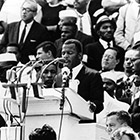
Integrity and Defiance in Equal Measure
Percival Everett’s James, set in the nineteenth century, is a novel of the present moment—when legal measures that were once regarded as essential components of racial justice are being dismantled.


Percival Everett’s James, set in the nineteenth century, is a novel of the present moment—when legal measures that were once regarded as essential components of racial justice are being dismantled.

Bly’s 1887 masterpiece Ten Days in a Mad-House reminds us that the ultimate test for public safety programs for the mentally ill is their impact on the most vulnerable.

The Russian government’s decision to use the WNBA star as a bargaining chip illustrates the weakness of its diplomatic efforts.

The Biden administration announced that it will accelerate plans to relocate Afghans who worked with the U.S. military. Their situation demands the most urgent response possible.

To honor the 1965 Selma to Montgomery Voting Rights March, we must continue the work it started.

After the civil rights movement, John Lewis moved from protest to politics. But he remained optimistic about the Black freedom struggles of the twenty-first century.

The president’s refusal to concede lays groundwork for the narrative of a new “Lost Cause.”

In a moment when Black Lives Matter has succeeded in bringing longstanding police abuses to public attention, Lewis’s legacy has never been more visible.

The pragmatic engagement that Marshall believed in required the United States to know its limits but also to honor its values whenever possible.

At the dedication for the Lincoln Memorial, President Harding portrayed Lincoln as the president who “maintained union and nationality” rather than the president who ended slavery. Changing the monument’s meaning took political struggle.

At its best moments, Roseanne offered something Roseanne Barr’s tweets did not: empathy, nuance, and a portrait of white working-class life rarely seen on television.

The student-led movement against gun violence is inseparable from the broader range of social movements that have sprung up in the Trump era.

“I am not looking for approval,” Kaepernick has told the media. “If they take football away, my endorsements from me, I know that I stood up for what is right.”

The 53 percent of white women who voted for Trump represent a major political constituency; but if Saturday was any indication, they may before long be outnumbered by the likes of the marchers I saw holding signs that said, “Women are not up for grabs.”

The Trump camp’s response to Friday’s statement from the Hamilton cast reveals a dangerous double standard on civility.